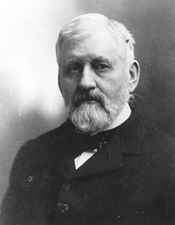Encyclopedia Dubuque
"Encyclopedia Dubuque is the online authority for all things Dubuque, written by the people who know the city best.”
Marshall Cohen—researcher and producer, CNN
Affiliated with the Local History Network of the State Historical Society of Iowa, and the Iowa Museum Association.
ALLISON, William Boyd
ALLISON, William Boyd. (Perry, Wayne County, OH, Mar. 2, 1829-Dubuque, IA, Aug. 4, 1908). United States Senator from 1873 to 1908. Known as the "Gibraltar of Iowa Democracy" and "Mr. Republican" for nearly two decades, Allison, the senior Republican member on the Committee on Appropriations, was the single most powerful Congressional voice on all decisions involving finances. Allison also served on the Committee on Finance and was considered an expert on tariff concerns. He gained less obvious power from his membership in "The Four" (with Nelson Aldrich of Rhode Island, John C. Spooner of Wisconsin, and Orville H. Platt of Connecticut), all members of the Committee on Finance who dominated the Congress. Allison was also a member of the Committee on Committees, chairman of the Republican caucus, and chairman of the steering committee.
Allison settled in Dubuque in 1857. Although the community was strongly Democratic, he joined a local law partnership, joined a Presbyterian church, and rose to leadership in the young Republican Party in the state. In 1859 he was a delegate to the Republican State Convention and in 1860 was a state delegate to the national convention. Although he did not receive the political appointments he desired, Governor Samuel J. Kirkwood appointed him to be one of his military aides. In this role, Allison proved to be a good manager of the transportation, organization, and medical needs of Iowa volunteers enlisting in the Dubuque area.
Allison began his legislative career on March 4, 1863, with election to the 38th Congress. Helping him in the effort were the political connections he had developed during the CIVIL WAR with Governor Kirkwood. He quickly joined the ranks of the Radical Republicans and opposed Lincoln's plans for Reconstruction. During the first two years he was a member of Congress, he introduced a bill for improving the navigation of the MISSISSIPPI RIVER and it was through his influence that the land grant was secured for the railroad leading westward to McGregor, Iowa. While in Congress, he supported every Republican measure including the Civil Rights Bill and the Freedman's Bureau Bill.
In his second term, Allison became a member of the powerful Ways and Means Committee. He also gained a reputation for his knowledge of tariffs and railroads. He was a supporter of moderate tariffs that benefited agriculture. He declined to run for re-election to the House in 1870, and was an unsuccessful candidate for the U.S. Senate.
Allison returned to his legal practice in Dubuque but was elected to the Senate in 1872. In 1875 Allison was one of the commissioners appointed to negotiate with the SIOUX for the sale of the Black Hills. The unsuccessful venture failed to stop white trespassing on sacred Native American land and led to the massacre of General Custer at Little Big Horn. Allison continued his service in the Senate for thirty-five years and five months.
Allison's political alliances and his position in the United States Senate led him to be the center of the "Des Moines Regency." This small group including James Clarkson of the Iowa Sate Register, Charles E. Perkins of the Burlington Railroad and Joseph W. Blythe had tremendous influence in the state on country, district, and state conventions.
Wedded to his work after his second wife's suicide in 1883, Allison found in the Senate nearly his only pleasures in life. His most famous legislation was the Bland-Allison Bill of 1878 that restricted the unlimited coinage of silver and reestablished the silver dollar as legal tender.
In 1888 Allison launched an unsuccessful campaign for the Republican presidential nomination. He was nominated in 1896, but lost to the man who became President of the United States, William McKinley. Allison's long record of political service was brought out during his 1908 campaign when it was discovered that not one member of Congress from 1863, when Allison entered the House of Representatives, was still serving.
Held in high esteem by others in governmental service, Allison was offered the position of secretary of the treasury by presidents Garfield and Harrison. President McKinley asked him to be secretary of state. Allison declined all these offers and served as the Senate majority leader in 1897, 1904, 1906, and 1907-1908.
By 1907 the eighty-year-old senator was suffering from cancer and left the campaigning for renomination to his friend and colleague, Senator Jonathan P. Dolliver. He won the campaign in June but died at his Dubuque home in August.

---
Source:
Hudson, David, Bergman, Marvin, Horton, Loren. The Biographical Dictionary of Iowa. Iowa City: University of Iowa Press, 2008
History of Dubuque County Iowa. Chicago: Western History Company, 1880









